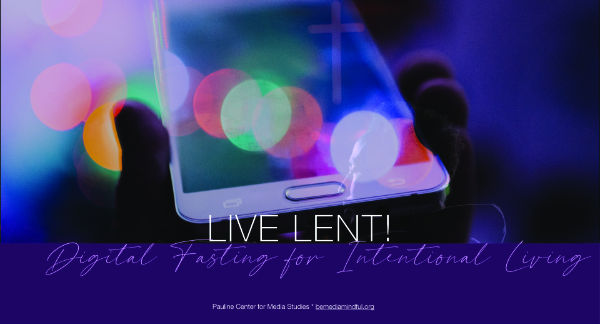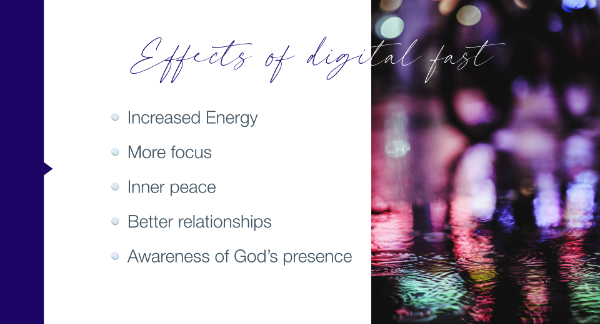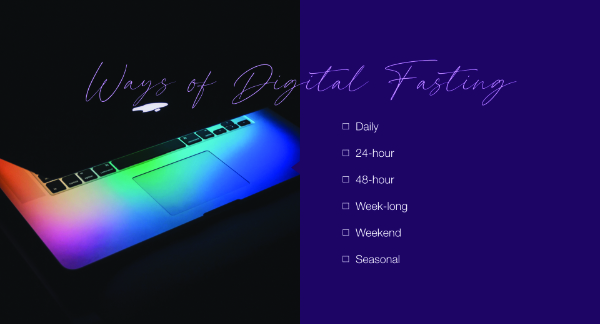Every Lent I wonder what I will do to enter more profoundly into this penitential season: Should I refrain from sweets, coffee (Hmm, not really a good idea!), gluten? All are good and probably healthy choices. Then I reflect upon what would really alter my life dramatically toward Christ, and realize how life-consuming is my digital technology.
I’m a film and television reviewer, so I watch a lot of movies and streaming shows, commenting on human values present or absent in these stories, besides being an avid social media user. Even though I use all these media for my ministry, I sometimes feel the adverse effects of screen use on my health, energy, and overall well-being. I decided to stop and take notice of what was the real problem with my screen time. I took an assessment of one point in my day. It was then that I realized that I was jumping from text notification, to checking email, to reviewing how many likes I received on my awesome Instagram post, to looking at a news story on Facebook, that led me down a rabbit hole of endless information and advertisements. It became a continuous stream of attention-getting time spent on my screen. An hour later, I had to anxiously scramble to do my work that should have been done an hour ago! Not only that, but I felt emotionally drained and frustrated since something I read online disturbed me. It was then that I realized I needed to fast from my media by setting parameters for myself during the day and for entertainment use at night.
Unplugging during Lent
Did you know there is a National Day of Unplugging? Having been around for a decade, it began through the efforts of wellness advocates to educate on tempered media use. It is the first weekend of March and so falls this year on March 5-6 for a full 24-hour digital media unplugging. It’s appropriate that it lands during Lent since it fits with one of the Church’s three Lenten penances—fasting, prayer, and almsgiving. Unplugging is basically about fasting from our technology.
Lent is the Church’s way of helping us take an assessment of our lives. It’s like one long retreat to help us step back interiorly and question how we are living: Do I have an intimate prayer life with Christ? If not, what keeps me from prayer? Am I at peace and happy with my life right now? If not, what clutters my mind and heart? What bad habits prevent me from living a holy life with Jesus? What do I need to change? What is my relationship with my digital media or media in general? What role does it play in my life?

What is fasting, really?
Wellness websites promote intermittent fasting as a trendy diet process and a way to make healthy choices. In this sense, fasting is to do without all or some food or drink at specific periods of time. A noble practice, this process reflects the virtue of self-control and moderation. All of these methods are praise-worthy and notable disciplines to live healthier lives. Yet fasting is more than a fad.
Fasting as a spiritual discipline helps us focus on what is truly important by paring down to the essentials—seeking union with Jesus and finding inner peace—the call to holiness within our everyday experience. Jesus calls each one of us to an intimate relationship with himself—drawing us into God’s self-communicative love—a love that generates life and gives happiness now and especially in heaven. We don’t fast for fasting’s sake. We fast in order to grow in love of Jesus and our neighbor—the two greatest commandments.
Why a digital fast?
The sometimes-unhealthy choices we make with our digital media may increase our anxiety and lead us to isolation from authentic and life-giving encounters with other people, especially the people we most care about, and more importantly from God. Loneliness and frustration, as well as dissatisfaction with ourselves are sometimes side effects of our digital usage. All are reasons for doing intermittent fasts, not with food, but with our screens.
Not all media is bad and not all of it has to be removed from our lives, even if we do abstain the media. But we can understand the role of digital media in our lives by becoming more media mindful.
Effects of a digital fast and our Lenten penances

Most of the time when we choose to embark on an adventure, we do so to seek a good benefit for ourselves. Doing a digital media fast provides numerous benefits to our physical, mental and spiritual health.
- Increased energy—Prolonged screen time can sap energy, especially if it is at night right before going to bed through texting or viewing, preventing restful sleep. Physical activities increase the heart rate and provide oxygen to the blood cells, thereby increasing physical and mental energy.
- More focus—Scattering brain functions in many different directions lessens awareness of the task at hand. Shutting off phone notifications, turning off streaming shows, and avoiding checking email during work or study can help the brain focus on one task at a time, thereby increasing attention.
- Inner Peace—Digital media sometimes becomes fillers for boredom. Putting away the phone and noticing who and what is around you affords an opportunity to thank God, the creator of all for the present moment, where peace is found.
- Better relationships—When everyone you’re with is on their phone instead of interacting and listening to one another, how intimate are these relationships? Truly listening to others shows interest, concern and love. The more we listen to those we love, and especially to God who speaks to us in the silence, the stronger will be our relationships and they will add to our quality of life.
- Awareness of God’s presence—For Christians, this is a key element to any type of fasting. We do this not only to feel good about ourselves, but most particularly so we can recognize with greater clarity God’s grace at work in and around us and so respond with generosity and love to a God who pours his superabundant love upon us.
Ways of digital fasting

You may be wondering, what do you fast from especially in regard to your digital media and how? Just like fasting from food and drink, media fasts can be done in various ways. They can be intermittent, especially if you need your screens for work or study, and so can be targeted to specific media or apps. Or they can be centered on conscious choices about what we post and how often we create and engage with our media. Here are some suggestions:
DAILY FASTS
- Turn off your phone from 10pm to 8am the next morning. Living without digital interruptions for 10 hours straight offers a peaceful evening and a complete night’s rest.
- Give yourself only certain times during the day when you will check your phone notifications, such as at 9am, 12noon, and 6pm. Silence all the notifications so they do not go off all during the day.
- Use the T.H.I.N.K. acronym before posting/sharing anything on your feed. Is it true, helpful, inspiring, necessary and kind? If not, refrain from posting or sharing.
- When catching up with friends or family (coffee, lunch, dinner), suggest no phones during your meal. In a non-aggressive way, challenge the others to go for one hour without checking their phone. See where the conversation goes!
24 HOUR FASTS
- Do a complete digital fast by turning off your phone and digital devices and store them away for a 24-hour period. Evaluate how many times you had the urge to turn on your phone or iPad during that time. What did you do instead?
WEEK-LONG FASTS
- Stay off of all social media for a week. Remove the apps from your phone.
- Instead of binging Netflix, go outside each evening for a walk around the neighborhood without your ear buds, and take notice of the trees, architecture, and people who live near you. Do this every day for a week.
SEASONAL FASTS
- Your media fast can be a form of penance during the season of Lent. You can do that by deleting problematic apps from your phone, such as Instagram, Twitter, or specific games that just fill time. Replace that time with prayer or spiritual reading.
- Reserve times for watching movies or television, perhaps once a week. Schedule movie night or watch a streaming show with friends talking about it afterwards. Keep the other evenings free to meet with friends, attend a Church event, or read a spiritual book.
As we continue this Lenten season and observe National Unplugging Day, let us consider our relationship to our digital media. May this practice of digital fasting lead us to the ultimate goal of union with Christ and peace with him forever!
About the Author

Sr. Nancy is the Director of the Pauline Center for Media Studies and a Media Literacy Education Specialist. She has degrees in Communications Arts and a Masters in Theology and the Arts from Fuller Theological Seminary. She has extensive experience in the creative aspects of social media, print media, radio and video production as well as in marketing, advertising, retail management and administration.
Sr. Nancy has given numerous media mindfulness workshops, presentations and film retreats around the country to youth, young adults, catechists, seminarians, teachers and media professionals helping to create that dialogue between faith and media. She is a member of NAMLE (National Association of Media Literacy Educators), SIGNIS (World Catholic Association for Communicators) and THEOCOM (Theology and Communications in Dialogue) and board member of CIMA (Catholics in Media Associates). She is the author of a theology of popular culture called, A Sacred Look: Becoming Cultural Mystics from Wipf & Stock Publishing. Sr. Nancy is a theologian, national speaker, blogger and film reviewer.